Drums
Karen Carpenter, The Drummer Who Sang
Today, let’s talk about a very talented lady, famous for her unique voice, a distinctive three-octave contralto vocal range (contralto or alto is the lowest female voice type, typically around F below middle C to the second F above middle C), and a gifted drummer, Karen Carpenter.
Karen Carpenter was the well-known other half of the duo The Carpenters with her brother, Richard.
Younger Days
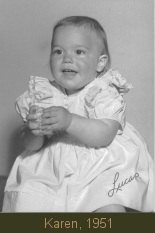 Karen was born on 2 March 1950 in New Haven, Connecticut, U.S. At the very young age of 4, she was enrolled in a ballet and tap dancing classes for she enjoyed dancing a lot. In June 1963, after her father received a job offer from a former business associate, her family moved to Downey, Los Angeles, California.
Karen was born on 2 March 1950 in New Haven, Connecticut, U.S. At the very young age of 4, she was enrolled in a ballet and tap dancing classes for she enjoyed dancing a lot. In June 1963, after her father received a job offer from a former business associate, her family moved to Downey, Los Angeles, California.
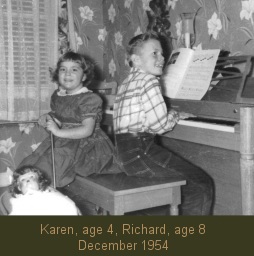
In 1964 at the age of 14, Karen entered Downey High School where she was a year younger than her classmates. To avoid gym classes, she joined the school band and was given a glockenspiel by their conductor Bruce Gifford. But she didn’t like the instrument. After seeing her drummer friend and classmate Frankie Chavez performed, she fell in love with the drums and asked if she could play those instead. Karen’s favorite drummers were Ringo Starr and Joe Morello who uses Ludwig drums, and that became the reason why she wanted to have the same brand too. Chavez started to teach her how to play drums, but Karen’s enthusiasm made an initiative to teach herself on grips and learn to play complicated lines. And just within a year, she could already play the “Take Five” by Dave Brubeck.
In spring of 1967, Karen graduated from high school with a John Philip Sousa Band award. She was a music major at Long Beach State (California State University, Long Beach), and also a member of the college choir where she performed with her brother Richard. She was given lessons by their Choir’s director, Frank Pooler, to help her develop a three-octave range after he discovered her great voice.
Career
Karen was a great performer, but did you know that at first she was nervous to perform in public? Well, she conquered it saying that she “was too involved in the music to worry about it”.
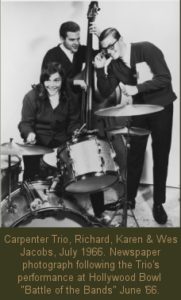
In 1966, they were invited to audition at a session with Joe Osborn, a well-known bassist who is a member of The Wrecking Crew (a loose collective of Los Angeles–based session musicians). As everyone expected for her to be the drummer, Karen tried to sing and all were impressed with her distinctive voice. Because of this, Osborn signed a recording contract with her (Magic Lamp Records) but was not interested to involve Richard.
In 1967, Karen and Richard formed a new group, Spectrum, after Jacobs left to study at the Juilliard School (a well-known private performing arts conservatory in New York). Spectrum focuses more on harmonious vocal sound.
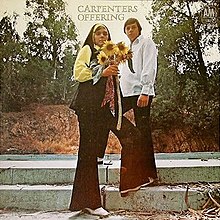
Even though Karen loves drumming, she only played drums on Ticket to Ride and on the Now & Then album except for “Jambalaya”. Special credit to Hal Blaine who played the drums mostly during studio sessions.
Let’s check out her Discography here:
Studio albums
- Offering (later reissued as Ticket to Ride) (1969)
- Close to You (1970)
- Carpenters (1971)
- A Song for You (1972)
- Now & Then (1973)
- Horizon (1975)
- A Kind of Hush (1976)
- Passage (1977)
- Christmas Portrait (1978)
- Made in America (1981)
Posthumous albums
- Voice of the Heart (1983)
- An Old-Fashioned Christmas (1984)
- Lovelines (1989)
- As Time Goes By (2001–2004)
Solo albums
- Karen Carpenter (1996, recorded 1979-1980)
Solo singles
- “Looking for Love” (1966)
- “If I Had You” (1989)
- “Make Believe It’s Your First Time” (1996)
Karen did a solo album that was released just in 1996. Though she had her first solo single released in 1966 that was written by Richard, the “Looking for Love”, it was in 1979 that Karen wanted to do a solo album. That was during Richard took off to treat his Quaaludes addiction. In early 1980, the album gained negative reactions from A&M executives and her brother Richard. Karen respected their opinions and decided not to release the album.
The Tragic End
In 1983, the music world was shocked when Karen Carpenter passed away at a very young age of 32 due to a heart failure from complications of “Anorexia Nervosa”. During that time, people are not aware of eating disorders and Body dysmorphic disorder (BDD) or sometimes called Body Dymorphia or Dysmorphophobia.
Let’s have a bit of info of the disorder that took away the life of a great drummer and vocalist, Karen Carpenter.
Anorexia nervosa or simply called anorexia – According to a health information, it is an eating disorder that is characterized by an abnormally low body weight, an intense fear of gaining weight and a distorted perception of weight.
People having an anorexia usually equate thinness with self-worth. It is very difficult to overcome that it could take over your life. They prevent gaining weight or continue losing weight by controlling calorie intake thru vomiting after eating or by misusing laxatives, diet aids, diuretics or enemas. And even though they already lost weight, they still have the fear to gain weight. And sadly, the main cause of anorexia is still unknown.
What happen and how did it started with Karen?
Back in her high school days, Karen had started her dieting. Under a doctor’s advice, she is doing the Stillman Diet (It is a high-protein, low-carbohydrate diet that was created in 1967 by physician Irwin Maxwell Stillman). Here, she only eats lean foods, and drink eight glasses of water per day, and strictly avoid fatty foods.
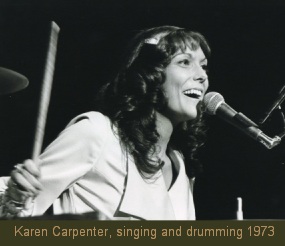
Because of that incident, she hired a personal trainer who advised her to change her diet. This caused her body to build muscles and this made her felt heavier instead of becoming slimmer. Due to this, the trainer was fired and Karen started her own weight loss schedule by counting calories.
Soon she lost about 20 lbs. and still hoping to lose more. Her eating habits had changed that she would remove her food from her plate and offer it to others whomever she was dining with.
In 1975, fans already noticed that there could be something wrong. But Karen refused to announced publicly that she was ill. During her appearance on Nationwide (BBC current affairs television program from 1969 – 1983) in 1981, when she was asked about anorexia, she simply answered that she was just “pooped”.
Later, Karen asked Richard for help but he and their parents did not know how. Karen then spoke with Cherry Boone, an American author, writer and singer who is an anorexia survivor. They contacted Boone’s doctor hoping that she could get better quickly. But according to the doctor, it could take one up to three years for the treatment. For her, it will be a very long medication that is why she chose to be treated in New York City by a psychotherapist Steven Levenkron.
In the late 1981, Karen used thyroid replacement medication, taking up laxatives from 80 – 90 tablets per night. It increased her metabolism and caused food to pass quickly through her digestive tract. Levenkron continued to treat her and confiscated the laxatives that Karen had misused. But her condition continued to get worse and even losing more weight.
In September 1982, Karen was admitted to Lenox Hill Hospital in New York. She was placed on intravenous parenteral nutrition.
- Parenteral Nutrition – feeding of nutritional products intravenously, bypassing the usual process of eating and digestion.
- Intravenous therapy (IV therapy) – medical technique that administers fluids, medications and nutrients directly into a person’s vein.
The procedure was successful. She gained weight but had a strain on her heart. After this, she learned to manage her weight properly.
November 1982, she returned to California and was determined to restore her career and start a new album with Richard. 17 December 1982, it was her last performance at the Buckley School in Sherman Oaks, California singing Christmas carols. And on 11 January 1983, it was her last public appearance at a gathering of the past Grammy Award winners commemorating the 25th anniversary of the awards show. According to Dionne Warwick, even though Karen looked frail and worn out, she looked vibrant and outgoing, telling everyone, “Look at me! I’ve got an ass!”.
1 February 1983, this will be the last time that Karen will see her brother, to discuss plans for the Carpenters and resume tours. 4 February 1983, Karen collapsed in her bedroom at her parent’s home in Downey. According to the paramedics, her heart beats once every 10 seconds. And at 9:51 am at the Downey Community Hospital, she passed away.
On 11 March 1983, an autopsy was released which ruled out drug overdose. The death was attributed to “emetine cardiotoxicity” due or as a consequence of anorexia.
- Emetine – a drug used as both an anti-protozoal and to induce vomiting.
- Cardiotoxicity – is the occurrence of heart electrophysiology dysfunction or muscle damage.
It was also discovered that Karen’s blood sugar level was 1,110 milligrams per deciliter, which is ten times more than the average. After 2 years, the coroner said that her heart failure was due to a repeated use of ipecac syrup (an over-the-counter emetic which is used to induce vomiting). Even though Levenkron said that he didn’t know Karen was using ipecac and not seen any evidence of vomiting, her friends were convinced that she had abused the thyroid medication and laxatives for her to maintain low body weight.
Legacy
Karen Carpenter is a great drummer and singer. Her voice and style of singing has been critically praised and influenced many musicians and singers like Natalie Imbruglia, Shania Twain, Sheryl Crow, and Madonna just to name a few. According to Paul McCartney, she had “the best female voice in the world: melodic, tuneful and distinctive”. And for Elton John, she has “one of the greatest voices of our lifetime”. As for her drumming, she has been praised by Hal Blaine, Cubby O’Brien, Buddy Rich, and by Modern Drummer magazine. And guess what?! In 1975, she won against Led Zep’s John Bonham as the Best Rock Drummer in a poll made by Playboy readers.
She received her Star for the Hollywood Walk of Fame on 12 October 1983, shortly after her death. In 1999, Karen ranked at no. 29 on the list of 100 Greatest Women of Rock and Roll made by VH1. In 2010, she ranked no. 94 on the Rolling Stone’s list of the 100 Greatest Singers of All Time.
Her struggle and death started to raise awareness on Anorexia Nervosa and other eating disorders, and The Karen A. Carpenter Memorial Foundation was started by her family to raise money for research.
Let’s relive Karen Carpenter’s happy and energetic drumming here!
THE CARPENTERS Live in Concert 1972 THE SONGS OF BURT BACHARACH (Medley)
Drum Solo, 1976
“Make it simple to last your whole life long. Don’t worry that it’s not enough for anyone else to hear. Just sing, sing a song.” – Karen Carpenter.
Thank you very much for your precious time to read my article. I really appreciate it a lot! Hope to see you on my next blog!

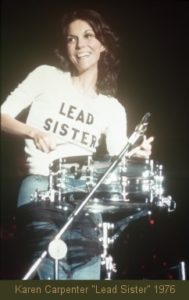
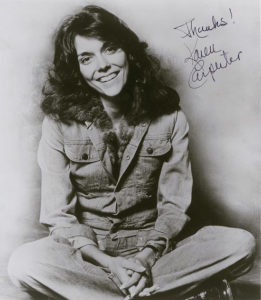

Great article. Very informative as to her drumming. With her voice and illness, that ability is too often overlooked!
Thank you very much Don. I am glad that you find it informative. And yes, I believe that not everyone knows how great drummer she was.
Karen Carpenter is the drummer who sang best music sheet. She sang for the Rolling Stones, Led Zep, and The Beatles. She’s even been on tour with The Band lately!